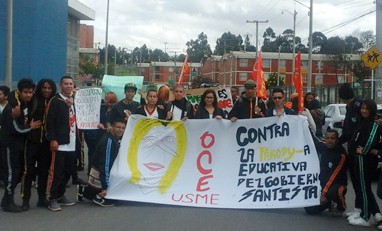
It is your responisbility to have all your paperwork in order, or you could end up in chains on a free flight home!
Daniel Warren argues that those who are working in Colombia illegally (or semi-legally) take all the risks while companies reap the rewards
The number of non-Colombians working here on a tourist or student visa is on the rise. But so too is the number of people being deported. So what are the risks?
For many employers, the benefits far outweigh the risks. They don’t have to pay taxes for your work, making them bigger profits. They don’t have to pay the health insurance contributions they are legally required to, nor the pension nor the liability insurance.
If you are working here without a legal visa, the risks are a lot higher for you. First you are not covered by insurance, so if you have an accident working illegally you will have to pay out of your own pocket. If you are caught, usually the department of immigration will give you a fine, and if you can’t pay it, they will deport you.
It is difficult to get accurate statistics because these issues are dealt with by three different departments. I personally know three people who could not stay in Colombia after having their visas refused or cancelled recently. I also heard of another ‘school’ that was shut down after giving student visas to people who then worked as English teachers. Those 120 non-Colombians lost their visas, and some subsequently had to leave the country.
Let’s be honest, we all know people here who exist (or have existed) semi-legally, using tourist and student visas. And most people have been fine for years. But it is worth understanding the possible consequences of what have – in some places – become ‘normal’ work practices.
If you are deported, you will be banned from re-entering Colombia for between six months and ten years. Not only that, the deportation will stay on file for the rest of your life. Any visa application you make to any country in the world will have to state that you have been deported for working illegally, and for modern passports, this is recorded in a digital database.
To give you a scenario that illustrates this: a US citizen gets deported from Colombia. They return to the USA, where they live in a northern state. This person wishes to join friends who are going for a drink or night out in Canada, but they might not be able to because their passport is flagged, since it’s on record that they have worked illegally and avoided taxes in Colombia.
Luisa Léon spoke to Migración Colombia to find out moreWhat is the penalty for working illegally? A foreign citizen who is working in Colombia and does not possess the appropriate visa will be subject to a financial penalty which can range between half and seven monthly minimum wages. What happens if you can’t pay the fine? If a person cannot pay the fine, or refuses to pay it, they will be entered into a deportation process. If deported, the foreign citizen will not be subject to an economic sanction. It is worth noting that following deportation, the person will not be able to re-enter the country for between six months and ten years, depending on the seriousness of the individual case. How many people have been deported in recent years for working illegally? So far in 2015, Migración Colombia has pursued 113 punitive administrative actions – fines or deportations – against people who were carrying out activities other than those authorised, or receiving unauthorised remuneration. Between 2013 and 2015, 57 foreign nationals were deported for exercising different activities from those authorised when they entered the country. |
If you are a citizen of the USA then you might have even more to worry about – legally, the tax forms you have to submit to the IRS every year are meant to declare all money earned here in Colombia. The IRS will be informed if you are deported for working illegally, which generally red flags you on their system for many years. You could also find yourself being charged with tax avoidance inside the USA for work you did here in Colombia.
And this is a best case scenario. By working without a visa you are guilty of tax avoidance and this can, and sometimes does, lead to a criminal record for tax evasion. As a consequence, you may never be able to work for a bank, and the tax office in your home country will pay closer attention to your finances. You may find it harder to get loans as you are now a higher risk for a loan company.
And this is assuming you avoid the worst case scenario: prison. It is extremely unlikely, but it is a risk when you break the law. If you haven’t heard horror stories about how overcrowded prisons are in Colombia, ask around! Colombia does have agreements with most of the countries you may come from, so you may be lucky and get to spend the potential five-year sentence in a prison in your home country – but only after spending about six months in prison here while the paperwork is sorted out.
DIAN, the Department of Immigration, the Ministry of Foreign affairs, and even the Ministry of Tourism have all been tasked with cutting down on the abuse of the system. And without wanting to sound like an old conservative, it is understandable; taxes allow the government to pay for services, repairing the roads, paying for the police, and everything else.
Now we all know there is a huge grey and black market in Colombia, and there are some benefits to this – particularly for small companies as it can help them to grow. But within bigger companies that have multiple contracts the line between black, grey and white work starts to become very blurry.
The final point to think about is that Colombia, along with many countries around the world, has the legal tenant “ignorance is no defence.” You have chosen to live in this country and by entering Colombia you have agreed to follow this country’s laws. As such you should weigh the risks; can you afford to be deported? Can you afford to have a criminal record for working illegally? Not least, could you survive six months in a Colombian prison if you can’t pay the fines or if you are the one chosen to make an example of?
It may seem like scaremongering, especially since there are so many stories of people being fined or skirting around the system. But however small, the risks are there and it is you, not your employer, who will have to face the consequences.
And they are risks you can avoid. Ask serious questions if you are being told it is OK to work without a proper visa. Check that your company has registered your RUT with the DIAN and that the taxes you pay on your payslip are roughly between 10% and 16% of what you earn. Most importantly – whether it’s about your visa, your taxes or your insurance – make sure you fully understand Colombian law so that you are in a position to make your own decisions.
Daniel Warren is the Director of El Centro de Idiomas, at Universidad Sergio Arboleda.
The Opinion section is a space for your views and opinions. We’ve featured articles on all aspects of life in Colombia – from the free trade agreement to bull fighting.Whether you agree or disagree with anything we’ve written, we’d love to hear your thoughts – leave a comment below, tweet us at @bogotapost, post on our Facebook page /BogotaPost or email us at [email protected].The articles in ‘Opinion’ are commentary, not news reporting. The views expressed in this section are those of the author and do not necessarily reflect those of The Bogota Post or its publishers. The publishers take no responsibility for the accuracy of any information published in this section. |





